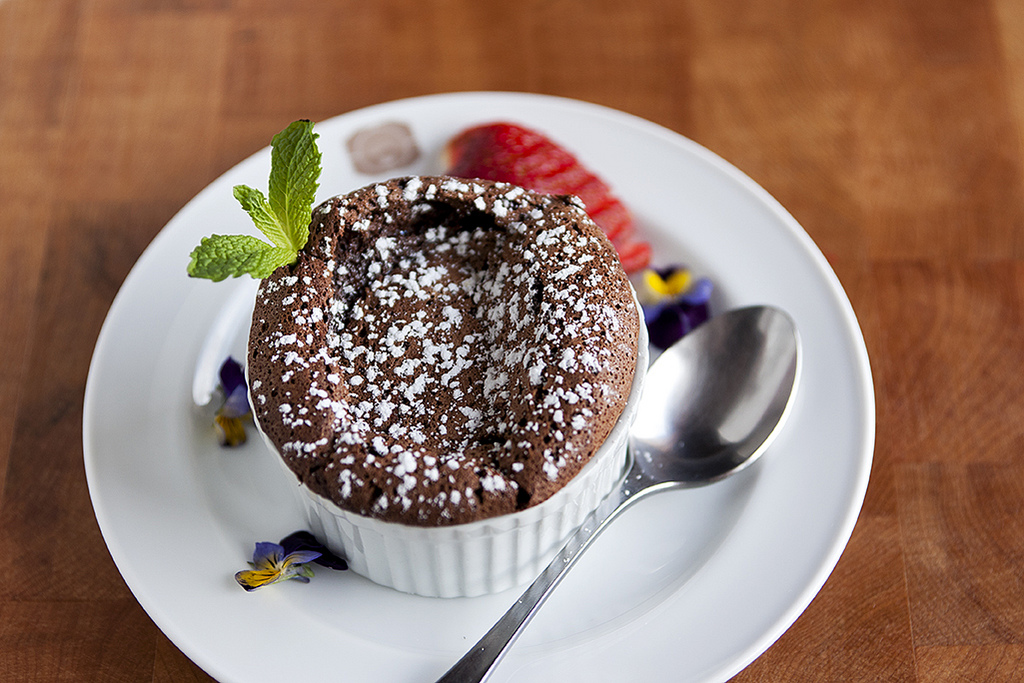| « DIY: Panera's Soba Noodle Salad | Baconfest Chicago Announces Ticket Date, Lineup » |
Random Fri Jan 17 2014
Steak vs Salad: Gendered Food Culture
 For shits and grins, my good friend recently dared me to take a food etiquette class, claiming I severely lacked a sense of dining propriety. Cackling with delight, I accepted the challenge. Naturally, I squirmed through most of the class, mentally mocking all the endless rules that I never followed anyway. Forks on left, spoons on right. No slurping. Don't overstuff your mouth. Then the instructor addressed all the women in the room, advising us that we should select lighter menu options, like salads or vegetarian sandwiches. If we do perchance lack any sort of willpower and submit to that pasta or burger, leave more than half. You are what you eat, the instructor stated with an emphatic nod.
For shits and grins, my good friend recently dared me to take a food etiquette class, claiming I severely lacked a sense of dining propriety. Cackling with delight, I accepted the challenge. Naturally, I squirmed through most of the class, mentally mocking all the endless rules that I never followed anyway. Forks on left, spoons on right. No slurping. Don't overstuff your mouth. Then the instructor addressed all the women in the room, advising us that we should select lighter menu options, like salads or vegetarian sandwiches. If we do perchance lack any sort of willpower and submit to that pasta or burger, leave more than half. You are what you eat, the instructor stated with an emphatic nod.
That was when I walked out.
I'm well aware that eating is a gendered experience, and that the general creation and consumption of food is divided between male and female lines. But damn if it doesn't frustrate me. Women are associated with light, delicate foods like fruit and cupcakes while men obviously prefer heartier and protein-laden options like hamburgers and potatoes. Most women, especially wealthier women, curtail calories in an effort to maintain slim figures, while men "diet" by lifting weights and going paleo. There are countless -- I mean countless -- dessert websites where sorority yogis and homemaker mommies post megapixels upon megapixels of caramelized (or happy shiny vegan) foodporn. Conversely, male-oriented food blogs almost always emphasize meat and fitness.
In the Observer, Grant Achatz said, "What is a masculine presentation? Is it a giant chunk of roasted meat? What makes that manly -- the caveman connotation? Dig into periods of time or age, geographical location, ethnicity and urban versus rural areas and you will find a separation in cooking familiarity and perhaps skill. But that has more to do with society's control over gender in general than the genetic makeup of people."
I concur that our eating habits are more culturally than genetically-influenced and that the media in particular plays a significant role. Why is Mom always stirring the pot on that Campbell soup commercial while dad flips beef patties on the Weber grill? Why are top chefs always male, always lauded for their creativity and leadership in the kitchen? Why are pastry chefs predominantly female and butchers predominately male (exception in Chicago: check out Kari Underly of Range)? Even Nigella Lawson, the one female judge on "The Taste," has no formal culinary training, wrote a book called How to be a Domestic Goddess, and arguably leads the shittiest team on the show.
 I fully realize there are exceptions. I also understand America's gendered food culture doesn't blatantly impact everyday life, but people do judge and discriminate others when they violate these norms. Though subtle and often unconscious, these internal assessments can be rather impactful in the long term. Please still hire me if I order the lasagna platter instead of some walnut arugula salad. If my boyfriend wants mango sorbet instead of a whiskey-infused bacon brownie for dessert, I won't doubt his virility and physical power. And if Dove bars don't make me "savor, sigh, and melt" with orgasmic and sinful pleasure, it's because I don't feel guilty about eating chocolate. I just don't -- it just tastes good.
I fully realize there are exceptions. I also understand America's gendered food culture doesn't blatantly impact everyday life, but people do judge and discriminate others when they violate these norms. Though subtle and often unconscious, these internal assessments can be rather impactful in the long term. Please still hire me if I order the lasagna platter instead of some walnut arugula salad. If my boyfriend wants mango sorbet instead of a whiskey-infused bacon brownie for dessert, I won't doubt his virility and physical power. And if Dove bars don't make me "savor, sigh, and melt" with orgasmic and sinful pleasure, it's because I don't feel guilty about eating chocolate. I just don't -- it just tastes good.
So when ordering at a restaurant, preparing a meal, or even watching a food show, reflect on the choices you and others make. Food preferences and habits don't always stem from the individual; they help define the boundaries of femininity and masculinity in our society.









Grace Meltesen-Lee / April 20, 2015 1:30 PM
Ms. Wu,
I am a University of Denver freshman in a writing class dedicated to food topics. I was intrigued by your article about the gendering of food and would love to set up a phone interview or email conversation about the topic. Thank you so much.
Grace Meltesen-Lee